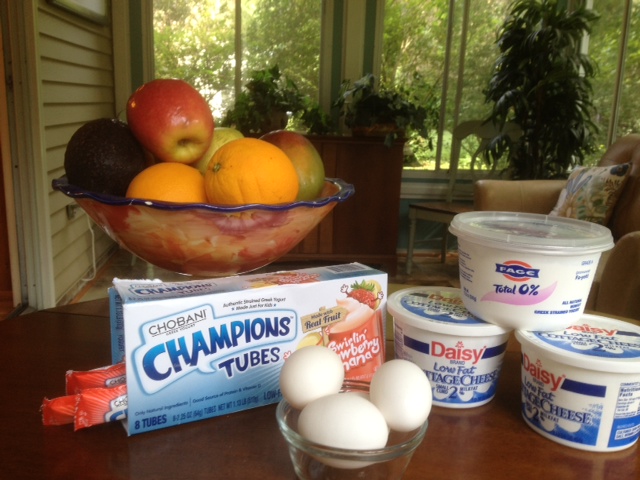Written by Jill Weisenberger, MS, RD, CDE
I am just back from a fabulous weight management symposium in Indianapolis. As usual when I attend conferences, I get to hear top researchers and practitioners discuss new and old research related to the ever-increasing problem of achieving and maintaining a healthy weight. At this conference and over the last couple of years, I’ve been learning more and more about the role of protein in healthy weight loss. Lately, I’ve been encouraging my patients to redistribute their protein intake over the day. Several sessions at this last conference reinforced that practice. I’ll summarize here.
According to research, consuming adequate protein, especially at breakfast, might increase feelings of fullness, reduce food intake later in the day, help maintain muscle mass while losing fat mass and even help prevent weight regain. This is not to say that we need a very high protein diet to lose weight. I do, however, interpret this to mean that we cannot afford a very low protein diet. When we cut calories to lose weight, we drop more than body fat. Initially, we lose water weight, but we also lose muscle mass (and potentially bone mass too). Strength training and adequate protein intake work together to preserve lean body mass. What seems to be even more important than the total amount of protein consumed in a day is the distribution of the protein. My experience with patients tells me many people consume just a little protein at breakfast, perhaps a little more at lunch and quite a lot at dinner. It appears that switching that up to consume moderate amounts at each of three daily meals offers the greatest protection against muscle loss and the greatest appetite control – a win-win! Because of this emerging research, I encourage my patients to consume about 25 – 30 grams of protein at each meal. For some, it’s hard to cut back to just three or so ounces of meat at dinner. It’s harder still for many people to consume that much at breakfast.
When helping my patients plan their meals, I ask them if they know which foods or food groups contain protein. Often the answer I get is just meat, cheese and yogurt. While it’s true that animal foods contribute hefty doses of protein, they are not the only protein-containing foods. Here’s a little summary for you.
- Lean meats such as poultry, fish and beef: ~ 7 grams/ounce
- Egg: ~ 6 grams/medium egg
- Beans: ~ 8 grams/1/2 cup
- Milk: ~ 8 grams/cup
- Vegetables: ~ 4 grams/cup cooked vegetables
- Whole-grain bread: ~ 4 grams/slice
- Whole grains: ~3-4 grams/1/2 cup
Since it’s often hard to come up with a protein-packed breakfast, here are a few ideas to get you started.
- 1 cup Greek yogurt, fruit, ½ cup Post Grape-Nuts cereal
- 1 cup cottage cheese, fruit
- Veggie omelet with 2 eggs, 1 cup milk, 1 slice whole wheat bread
- Turkey sandwich (2 slices whole grain bread, 2 ½ ounces turkey)
- ¾ cup black beans with salsa, wrapped in two 8-inch flour tortillas
If you have other ideas for breakfast, please share them. And let me know how redistributing your protein intake works for you.

